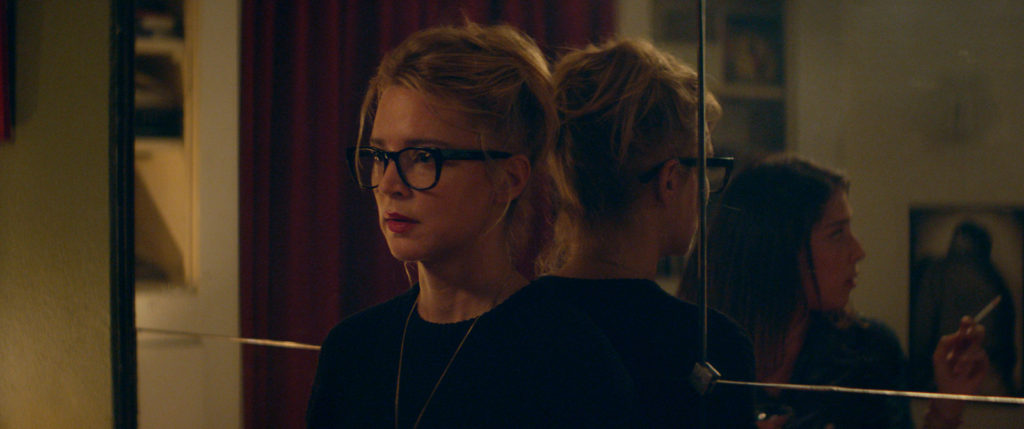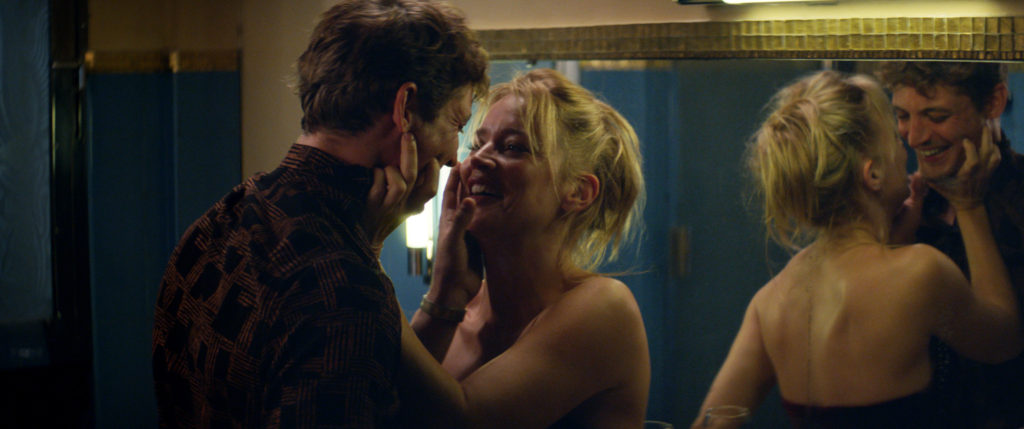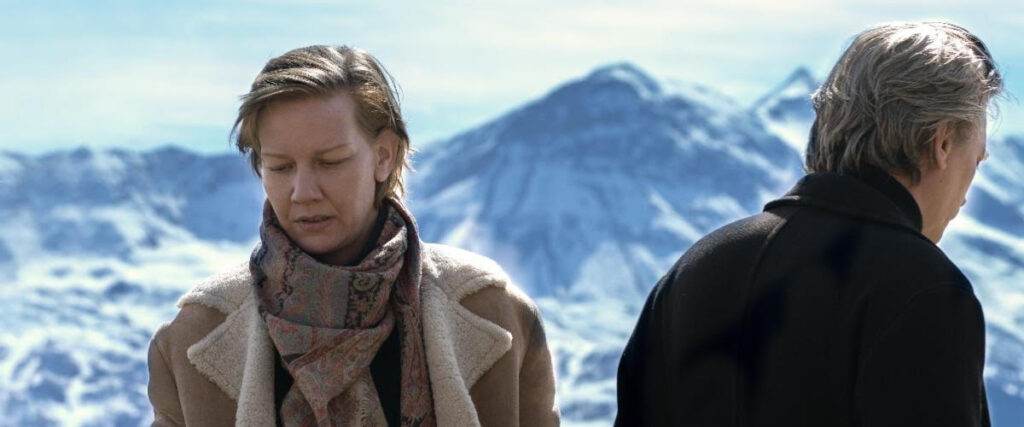
Anatomy of a Fall is such a great film, on so many levels, that it’s taken me an entire week to mull over why it’s so good.
Here’s the story. The successful German novelist Sandra (Sandra Huller) and her French husband Samuel (Samuel Thiess), a teacher and wannabe writer, live in his hometown in the French Alps near Grenoble. They moved there, into a chalet that needs renovation, after a car accident caused their now 11-year-old son Daniel (Milo Machado Graner) to lose his eyesight. Daniel and his dog Snoop return from a walk and discover Samuel, who has fallen to his death from the chalet’s high attic window. Only Sandra was home at the time of Samuel’s death.
The evidence from Samuel’s autopsy might point to a suicide or to a murder. The investigators find something provocative on a thumb drive, and charge Sandra with Samuel’s murder. Anatomy of a Fall goes from a whodunit to a courtroom drama, and then to a family psychological drama, as the trial reveals explosive secrets.
Director and co-writer Justine Triet makes ambiguity more delicious than we could possibly expect. As Jon Frosch wrote in The Hollywood Reporter about Sandra, “But Richard Kimble she’s not. ” We don’t know if Sandra, unlike the famed The Fugitive, is really innocent.
Sandra might be a Kafkaesque victim, unjustly put through a humiliating and terrifying trial, Or she might be an extraordinarily gifted sociopath.
Ironically, Sandra’s literary success has come from transforming her real life experiences, and those of others, into best selling fiction. But Sandra is very closemouthed about her own private life and anything but confessional. Her worst nightmare is to have details of her marriage and her sex life exposed in a public trial.
As the onion of Sandra and Samuel’s marriage is peeled back, Anatomy of a Fall explores just how multi-faceted relationships, the dynamics of guilt and resentment, and how a marriage survives a trauma – or doesn’t. And each scene is filled with ambiguity and the uncertainty of memory.
As the close of the trial approaches, there’s a a Wowzer cliffhanger that keeps us on the edges of our seats.
Although the story is set in France, most of the dialogue is in English because Sandra and Samuel speak English at home, and Sandra speaks English in the French courtroom.
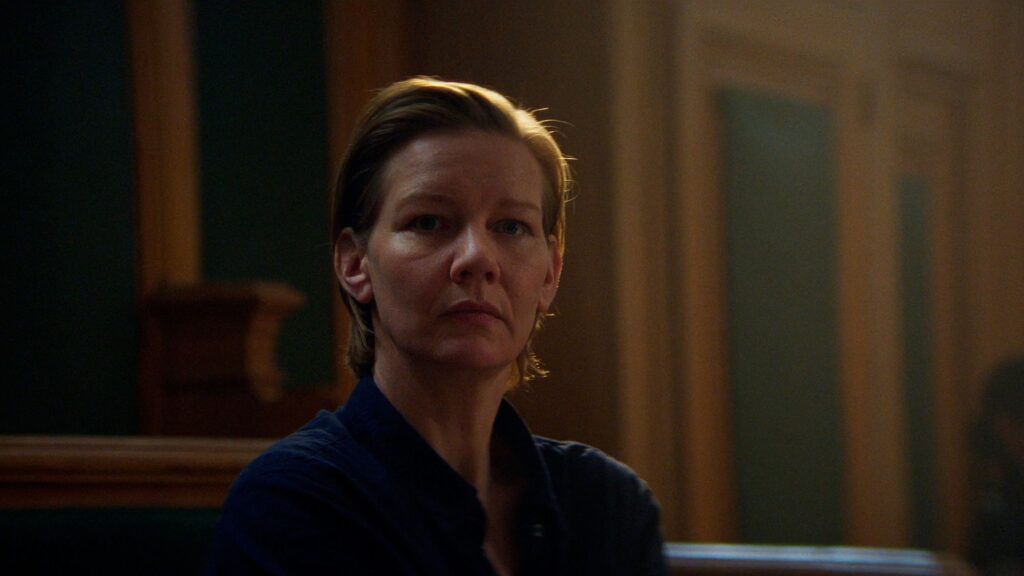
Sandra Huller must play Sandra so we believe that she could be innocent or guilty. In addition, Sandra’s character is complicated, even full of paradoxes. Huller’s performance has not been surpassed by that of any other screen actor this year, and she certainly deserves the Best Actress Oscar.
American art house audiences know her best for Toni Erdmann, where her corporate striver character must react to her zany father’s onslaught of ever more elaborate, outrageous and high-stakes practical jokes by maintaining a straight face and carrying on without giving away her shock, embarrassment and desperation. She’s on the verge of abject mortification for the entire movie. Hüller proved herelf a master of the take and the slow burn. She was similarly exquisite in a smaller role in Triet’s Sybil.
No one plays aggrieved, while struggling to maintain composure, as well as Huller. Can you imagine having to listen to your dead spouse’s shrink testify in public about all of his complaints about you in their private sessions? There are many injustices in that situation, and Huller makes us understand that Sandra is feeling each layer of indignity.
Huller has won Best Actress Awards from the European Film Awards and the Berlin and Toronto film festivals. She also stars in the upcoming Zone of Interest, another of the very most acclaimed films of 2023.
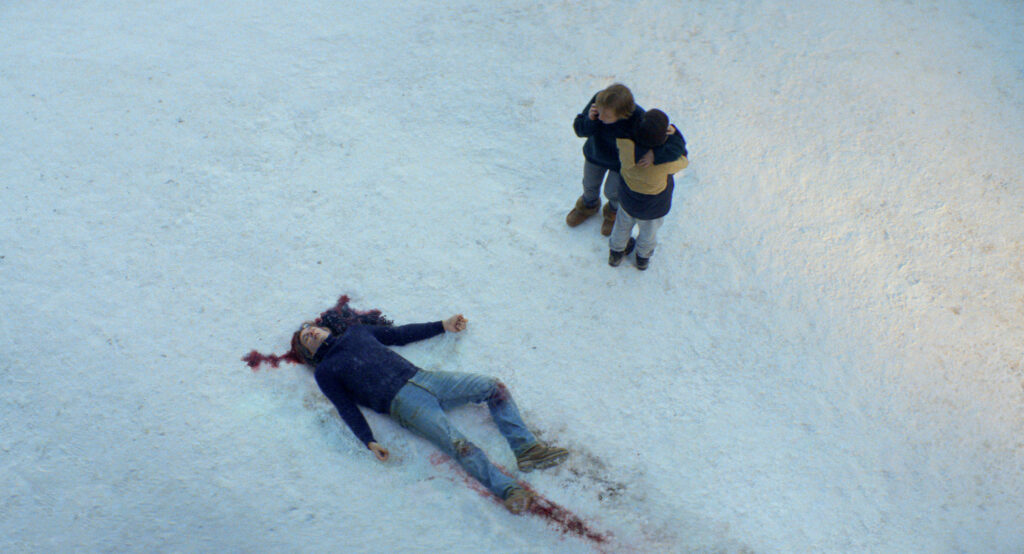
Anatomy of a Fall is just the fourth narrative feature for Justine Triet, a firecracker director. This one is the least comedic. I described her most recent film, Sibyl, as “masking its trashiness with expert filmmaking”.
In Anatomy of a Fall, Triet tells us so much before the opening credits. In just a few moments, we see both Sandra’s success and her off-putting manner, undeniable friction in her marriage, the boy’s visual handicap, his spirit and his loyal dog. And the discovery of a dead husband. Wow!
The entire cast is solid, especially Swann Arlaud (with a fabulous haircut) as the defense counsel, passionate about Sandra’s defense and perhap devoted to Sandra herself, but uncertain (and indifferent) as to her innocence. Samuel Thiess brings Samuel alive in flashbacks, especially in a searing mano-a-mano with his wife. Milo Machado Graner is wonderful as Daniel, a spunky kid who insists on his right to hear everything at the trial, but is unable to imagine all that will entail.
Howard Hawks said that a great movie is “three great scenes and no bad scenes”. There are no bad scenes in Anatomy of a Fall, and there are at least four great scenes:
- An incredibly authentic argument (in flashback) between husband and wife;
- Sandra’s courtroom confrontation with her husband’s shrink.
- Sandra’s testimony after the courtroom has listened to a taped conversation.
- Daniel’s explosive scene with his court-appointed social worker and Snoop.
BTW Snoop the dog is great. I’m now finding my own dogs very inadequate in comparison. There’s also the unexpected use of an instrumental version of 50 Cent’s P.I.M.P. to great effect.
Anatomy of a Fall won the Palm d’Or, the highest prize at the Cannes Film Festival. (That may indicate that the film is sublime like Shoplifters and Parasite or an unwatchable mistake like Titane, but, this time, it’s the former).
Anatomy of a Fall is high on my list of Best Movies of 2023 – So Far and is playing in theaters.

